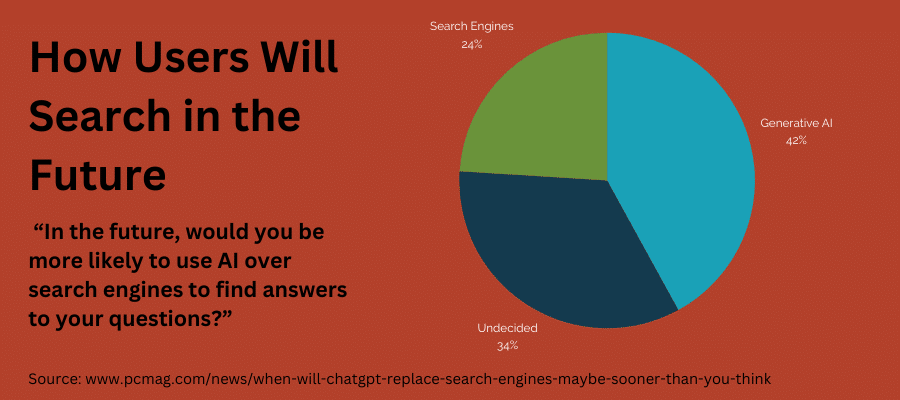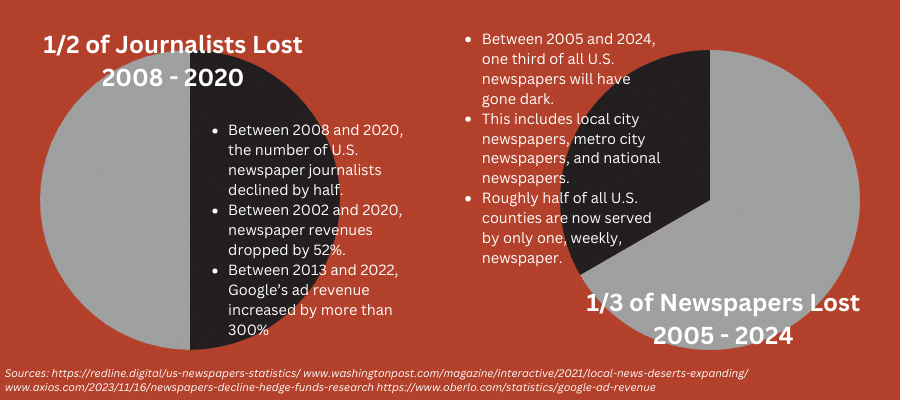
Generative AI models like ChatGPT are able to answer questions and provide information much faster than it would take a person to read through search results and gather their own conclusions. Does this mean AI will replace search engines? Are we at the beginning of a shift in how we use the internet? Let’s see how AI is poised to change search engines and how we gather information, and what this means for users, businesses, and marketers.
What is Generative AI?
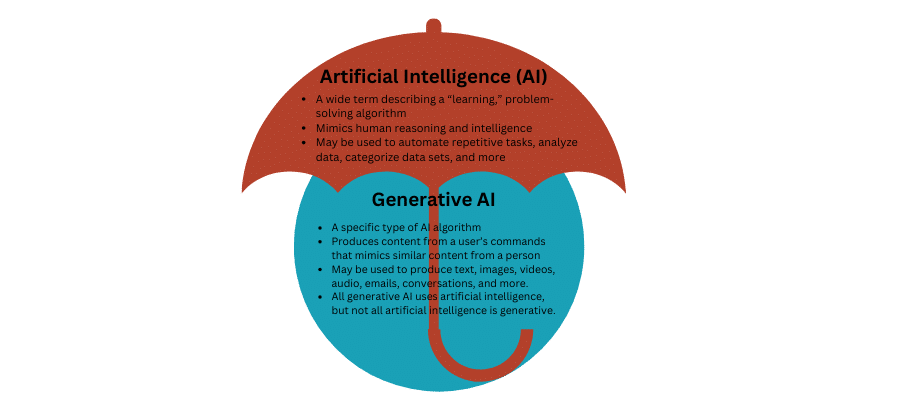
Artificial intelligence is a broad term, while generative artificial intelligence is a more specific type of AI.
Before we can determine whether technology like generative AI has the potential to replace search engines, it is important to establish what we mean by generative artificial intelligence (AI). In simple terms, generative artificial intelligence refers to learning models and algorithms that can produce text, images, audio, or other content.
Not all AI models are designed to produce content, which means not all AI are generative. Other types of AI are designed to analyze data and make predictions, classify data, group information, and much more. Though these models respond to inputs and provide answers or suggestions, they don’t produce content in the way we would typically consider it.
Artificial intelligence as problem-solving, learning programs have been around for decades. Though AI is not necessarily new, recent advances, such as transformer architecture in 2017, have helped the technology grow by leaps and bounds.
The Rise of ChatGPT
The meteoric rise of the generative AI algorithm ChatGPT really brought the concept into public view. Though ChatGPT’s parent company, OpenAI, was founded in 2015, and the first iteration of GPT was launched in 2018, the names weren’t widely recognized until about January, 2023, when it quickly reached 100 million users. ChatGPT’s user base had grown faster than any other technology to date. ChatGPT had officially entered the public consciousness, and so had generative AI.
A little over a year later, ChatGPT is one of potentially hundreds of thousands of other generative AI tools. AI is making everything from term papers to product reviews, movies to songs, paintings to poems, and much more.
Generative AI and Search Engines
Every major search engine, including Alphabet’s Google, Microsoft’s Bing, Baidu in China, and even DuckDuckGo have all introduced their own generative AI models, and are continually developing their applications and uses.
These technologies are changing fast, and can be difficult to keep up with. Just a few months ago, Microsoft’s BingChat became CoPilot, and Alphabet’s Google Bard became Google Gemini. More complicated is the fact that these search engines (Google search, Bing, etc.) are distinct tools from the generative AI tools (Gemini, CoPilot etc.). However, AI has long been a part of these tools; BERT, MUM and RankBrain, for example, are AI algorithms which helped to significantly improve Google’s search capabilities. These algorithms were not considered generative AI, though Google is now implementing generative AI into its search in some instances.
The distinctions can be murky, but this ultimately means that search engines and generative AI are close companions, though they are still separate tools at this time. So, what does this mean for search engines? What does this mean for users? Will AI replace search engines? And what does this mean for marketers, and websites that depend on user traffic?
Can AI Replace Search Engines?
Artificial intelligence has already changed how we search online. The previously mentioned AI algorithms Google employs have changed the results the search engine produces. However, the real question is whether or not generative AI will change how we search. Furthermore, will generative AI replace search engines as we know them?
Are Users Ready to Replace Search Engines with AI?
Though the widespread use of generative AI is still relatively new, some data points can show us how users are employing generative AI tools. A survey by Aberdeen Strategy & Research and PCMag asked over 600 professionals working across a variety of different industries about their usage of generative AI tools. About 60% of respondents said they had tried generative AI tools on either an extensive or casual basis. Of those users, about 80% said they believed generative AI chatbots (like ChatGPT, Google Gemini, or Microsoft’s CoPilot) would soon be able to answer questions more quickly than traditional search engines. Of all respondents, 42% believed they would soon use AI chatbots over search engines to find information, while only 24% stuck with search engines (34% were undecided).
Though this is only one survey, this data indicates that users are already prepared to use generative AI tools over search engines. Given the capabilities of tools like AI chatbots, this isn’t surprising. AI chatbots can provide an information overview, suggestions, and explanations in seconds, while a user scanning different search results and reading through different pages would need at least a few minutes. Generative AI simply gathers and distills information faster than a person can.
However, there are a few important caveats to generative AI’s capabilities. Will generative AI’s role in information gathering affect the accuracy or reliability of our conclusions? Will it affect the accuracy or reliability of information available overall? And, with AI producing answers and skipping over the need to click links and visit sites, what does this mean for news organizations, magazines, and other business websites?
Problems with Generative AI and Content Creation
We’ve previously discussed some of the pitfalls related to generative AI and content marketing, including inaccuracies and falsehoods, plagiarism, and a lack of originality. AI also tends to worsen biases and structural inequalities that already exist in the human brain or in our social structures. This then leads to inaccurate data analysis and, potentially, to conclusions that worsen harm against already disempowered people.
Another important problem has already appeared amongst generative AI models; content cannibalization or “model collapse.” AI models learn and improve from content produced by people. As more people rely on AI to produce content, the models will start to learn from content they have already produced. AI researchers have already tested this process, and watched the AI models become poisoned with their own ever-narrowing content. Without the introduction of new information or inputs, the content continually decreases in quality, scope, and accuracy. After about 10 iterations of this process, researchers watched the content devolve into nonsense.
Generative AI, Search Engines, and Disappearing Journalism
Many users rely on search engines or generative AI to answer questions or gather information about topics that are already known and established. For example, you might ask about the capital city of a country. However, search engines and, increasingly, generative AI are also the first stop for billions of people when gathering information about current events and news.
For example, you might ask about new capital cities, like the movement from Indonesia’s capital city from Jakarta to Nusantara, and how or why this occurred. Generative AI can provide some background information on this incident, but it can’t conduct interviews with Indonesia’s leaders or residents, and create a news story, like a person can. However, a person can’t conduct these interviews and take the time to create an accurate and informative story without resources, like the time, money, and technology provided by news organizations. These news organizations rely on regular readers and advertisers to provide these resources.
Google vs Journalists
As Google and other tech giants have increasingly monopolized control over advertising revenue, thousands of local and national newspapers have shuttered and shrunk. The disappearance of news at every level has serious implications for our awareness of things happening around us, but also our social connectedness, the stability of democracy, accuracy in reporting, and much more.
Recently, news organizations have tried to push back. In Europe, 32 publishers have sued Google for $3.2 billion in lost advertising due to monopolistic business practices. Last year, the US Justice Department sued Google over similar practices. However, generative AI presents an even more powerful way to remove individuals and advertisers from both local and national journalism.
With Google and Microsoft taking the helm of generative AI and showing little concern for the future of original content creation or news reporting, it’s likely that more news organizations will close without intervention. This then opens an avenue for the tech giants to enter the weakened publishing sector, enabling them control over both the distribution and creation of news content. This level of consolidation would seriously endanger the accuracy, scope, quality, and availability of local and national journalism.
Search Engines and Generative AI: SEO vs AIO
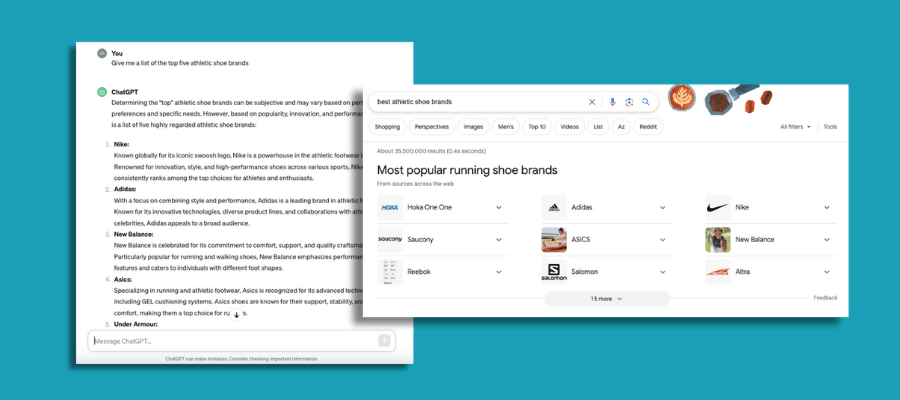
ChatGPT and Google produce similar, but different results when asked about athletic shoes. In the near future, artificial intelligence optimization (AIO) may become important for businesses wishing to appear above competitors in a generative AI tool’s responses.
When users enter a search into a search engine, they are most likely to click on the first three results at the top of a search engine results page (SERP). This means, if your webpages appear near the top of a SERP when users enter a relevant search, your website will get more clicks, traffic and, likely, more purchases or leads. With this in mind, digital marketers have used search engine optimization (SEO) strategies for decades, which helps a web page appear higher on more SERPs. But, if generative AI usurps search engines, will SEO still be relevant?
Generative AI is designed to answer a user’s query without clearly providing links or sources. However, AI does differentiate information as it generates responses. For example, if you ask ChatGPT about the best athletic shoes, it will produce brands like Nike, Adidas, and New Balance over Sketchers, Converse, or Reebok. These preferences have recently given rise to an alternative to search engine optimization or SEO called artificial intelligence optimization or AIO.
AIO is similar to SEO, but instead of reaching the top of a SERP, AIO is concerned with the best ways to insert a brand, company, person, or organization favorably into generative AI tools’ responses. To continue with our example, what existing content causes generative AI to prioritize Nike, Adidas and New Balance as the best athletic shoe brands, and what content would need to be created for a new brand to make the cut?
AIO strategies are still new and developing. These strategies will become more important as users shift from search engines to generative AI. It will also become clearer how users implement AI, what types of searches they perform, and when search engines might be preferable. This information will help to inform the best AIO strategies in the near future.
Generative AI and Falling PPC Ads
About 80% of Google’s revenue comes from ads, including PPC ads, display ads, YouTube ads, and others, amounting to about $238 billion in 2023. Many businesses buy these ads to put their names and brands in front of customers when they enter a relevant search. But generative AI does not supply a list of links like search engines do, so how would ads fit in?
Most users certainly wouldn’t miss ads. Fewer ads might help to make the information-search experience more enjoyable. Would this experience also be more fair? Would it be more helpful? That’s more difficult to say.
In some cases, businesses use PPC clicks to list their services first, when it might be difficult to muscle big brands out of top positions on an important SERP. Since a handful of businesses own the top results of most purchase-oriented searches, it can be particularly difficult for smaller businesses to break through. However, it’s generally true that the biggest brands also have the biggest budgets to spend on advertising, so PPC ads are most likely to benefit the biggest brands anyway. With that in mind, is it possible that generative AI tools can suggest brands or businesses that might be overlooked by search engines?
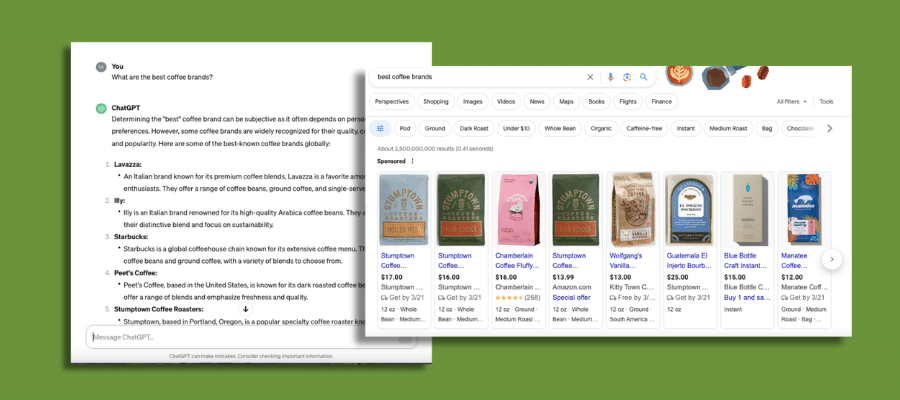
Generative AI tools and Google ads can show some different results. Generative AI tools like ChatGPT does not currently use ads, but this is unlikely to last long.
Unfortunately, it seems unlikely that generative AI will level the playing field between big and small businesses. Generative AI responses are based on content that already exists, and bigger businesses simply have more resources—including time, money, websites, and staff—to produce more content and get more links to their products. Google ads will show a few different results than generative AI when asked about a topic like “the best coffee brands,” for example, but many brands will be the same. Whether on search engines results or generative AI results, bigger businesses are simply better positioned to get more attention, clicks, and purchases.
Generative AI tools will, undoubtedly, sell ad space in the near future. There may be a brief period where ad space using these tools will be affordable, since their use is new, though this window of time will likely be narrow.
Conclusion: Will AI Replace Search Engines?
Ultimately, generative AI will almost certainly change how we search for information, get answers to questions, and navigate the web. This might occur in a few different ways. It’s possible that users will completely shift from using search engines to using generative AI. Or, perhaps more likely, some users will use generative AI often, some will use it intermittently, others won’t use it at all, or infrequently.
Users might also use generative AI to begin a search or answer a general question, and then use search results to dive deeper into a topic. If this occurs, web pages that offer detailed information, feature original research and primary sources, and provide helpful resources will be most valuable, while cursory pages will be overlooked in favor of generative AI. We’ve seen a similar process occur with the general internet and books, magazines, and journals; often, a general internet search is a good place to start for basic information, but can’t offer the depth or novelty that more specific sources can.
Generative AI will certainly become an increasingly important part of search, and of digital marketing. As this technology and its use develops, users, businesses, and marketers will be able to discern how to best optimize content for generative AI, and how content for search engines has changed. It will be especially important for institutions and businesses to track the development of, and provide support where possible, to journalism and original content creation to prevent the loss of robust news reporting and “model collapse” situations of generative AI. Appropriate regulation will also be important to control falsehoods and biases produced by AI and its users.

